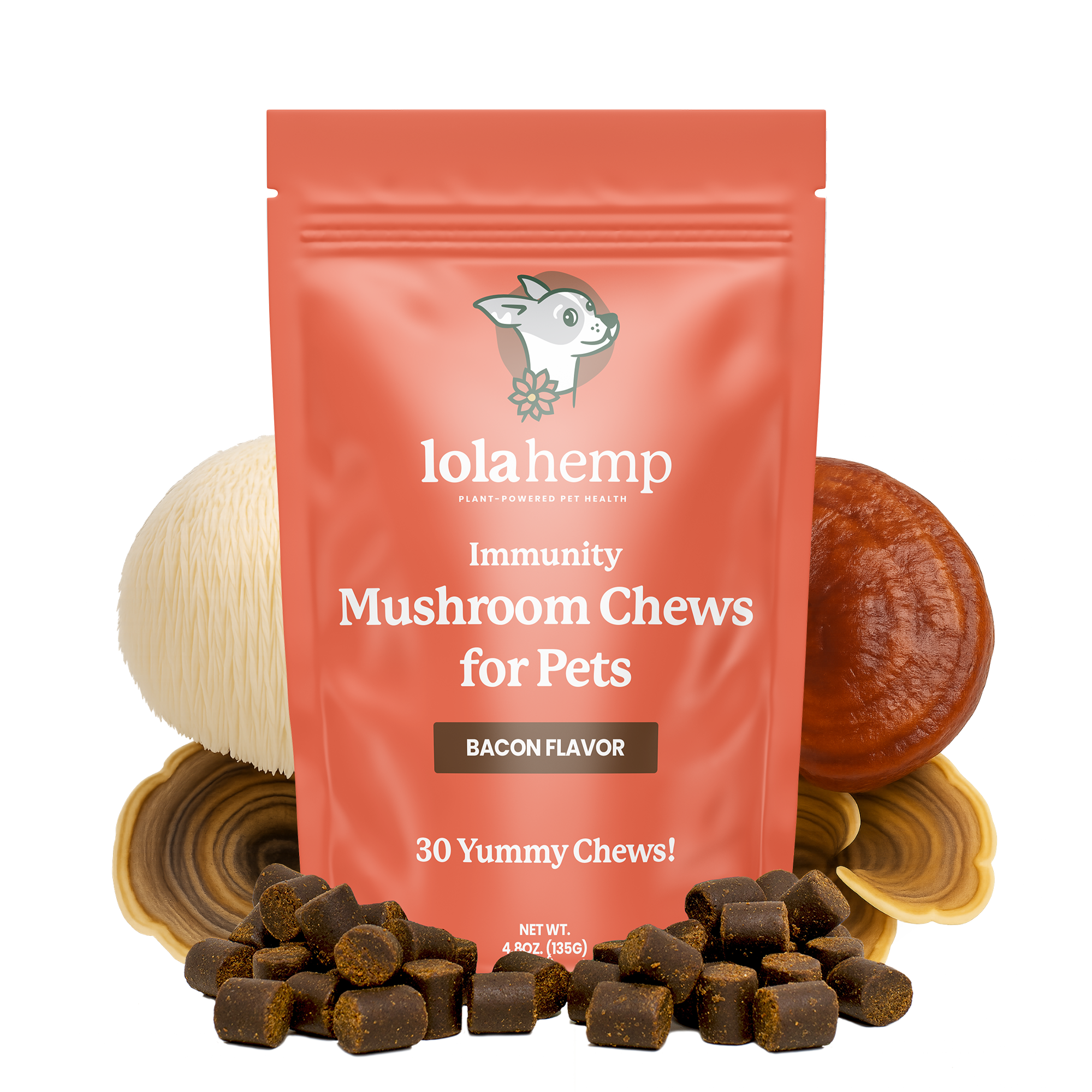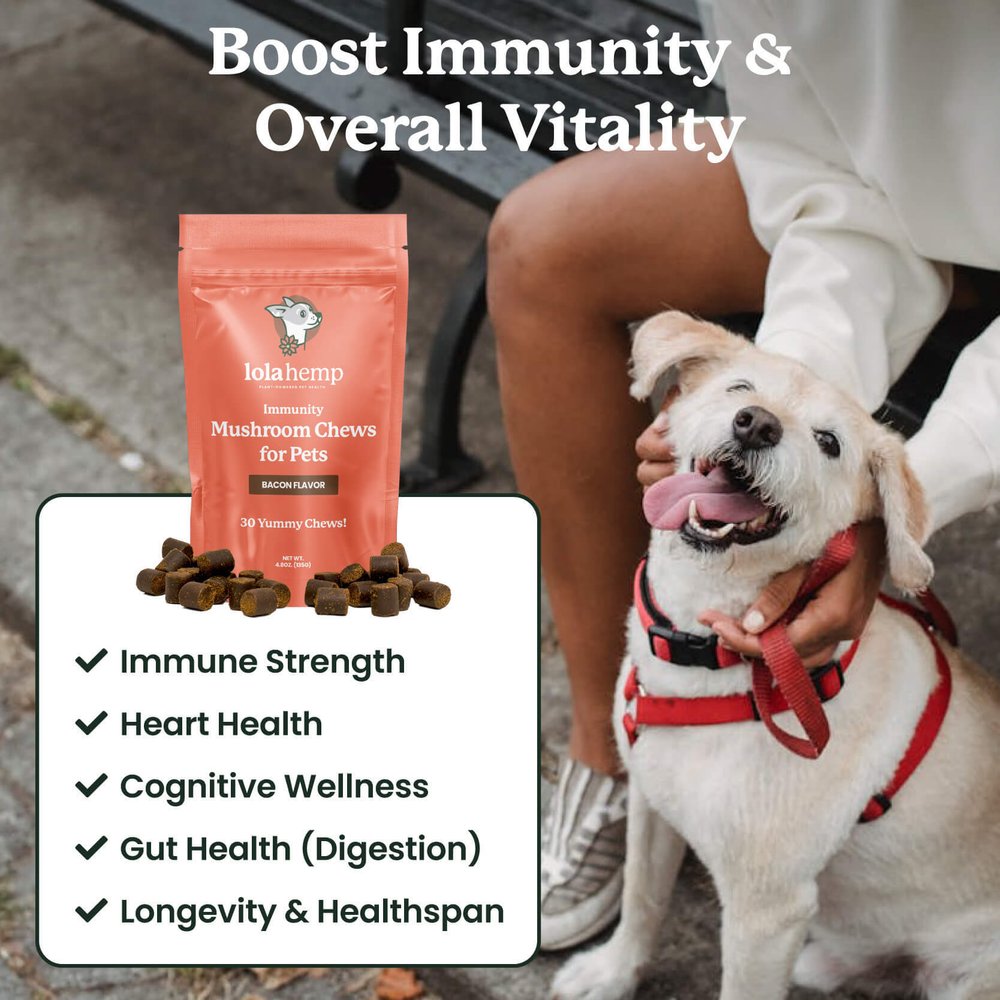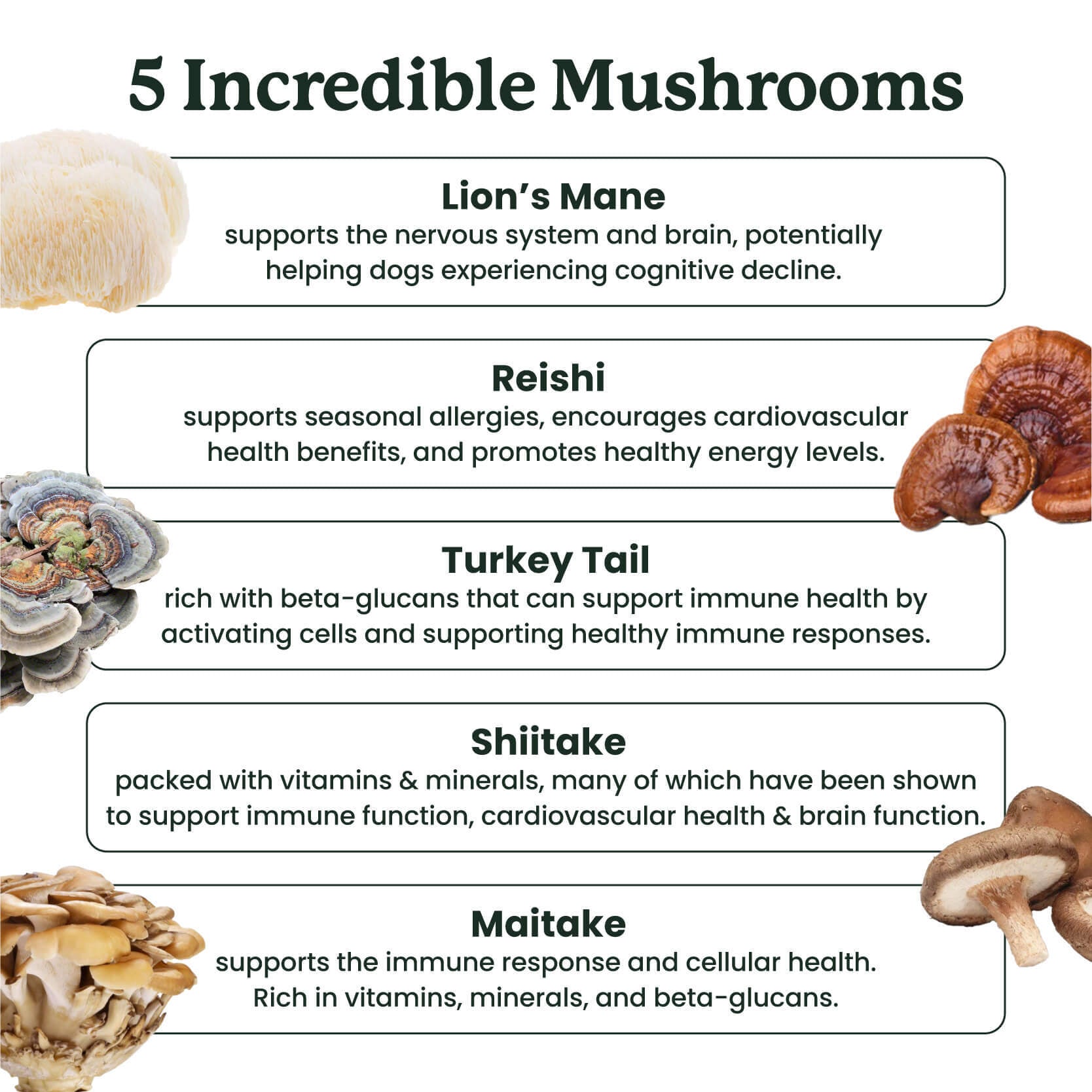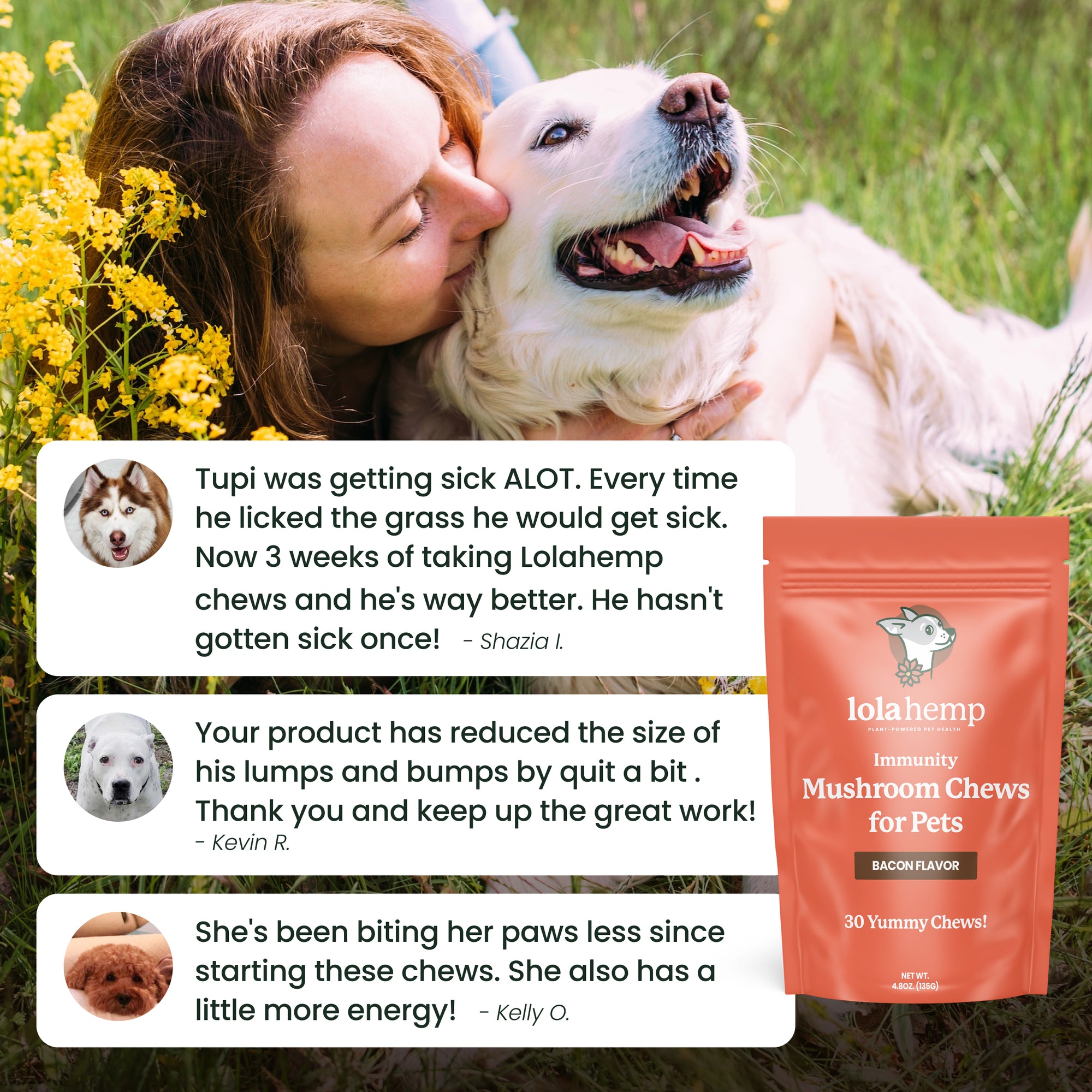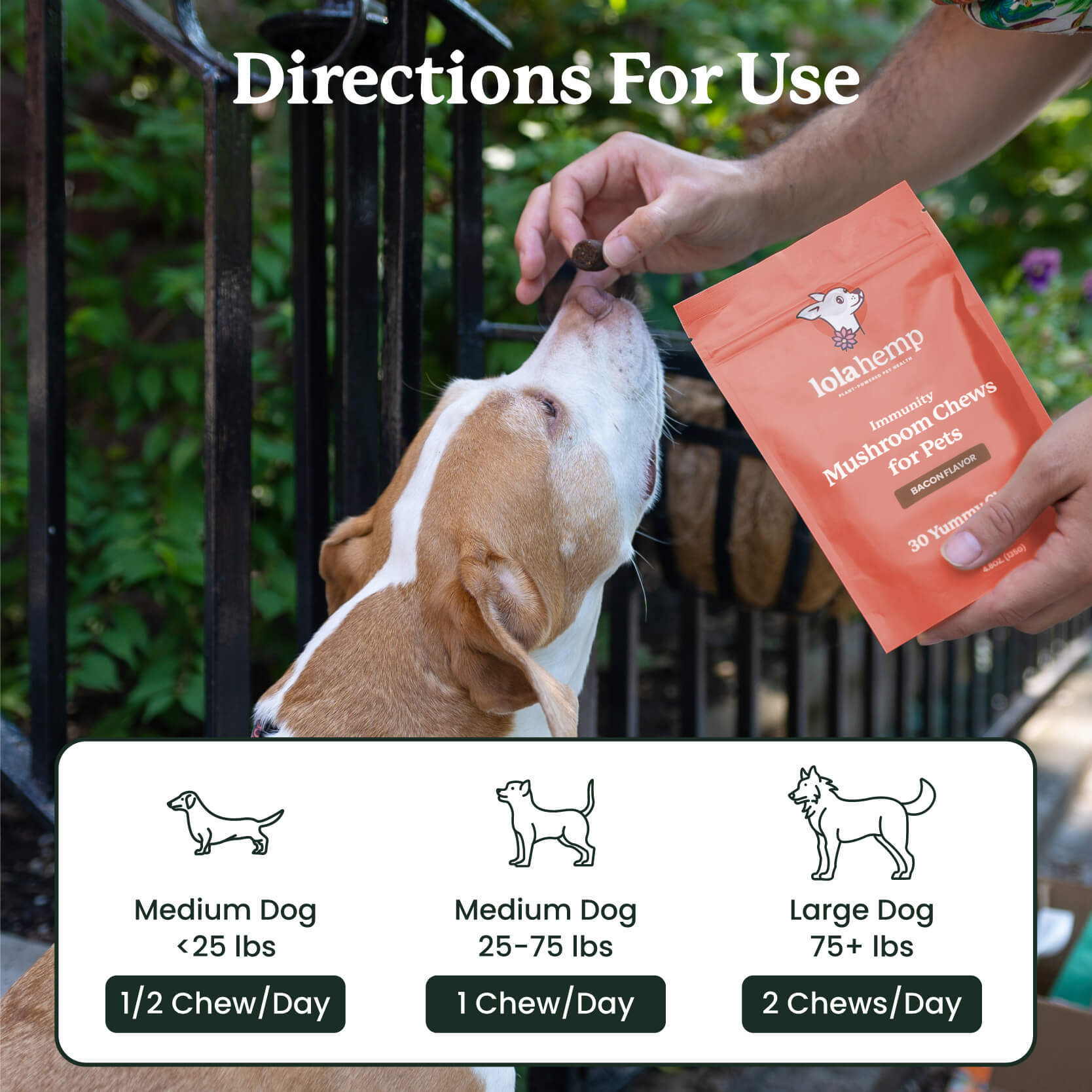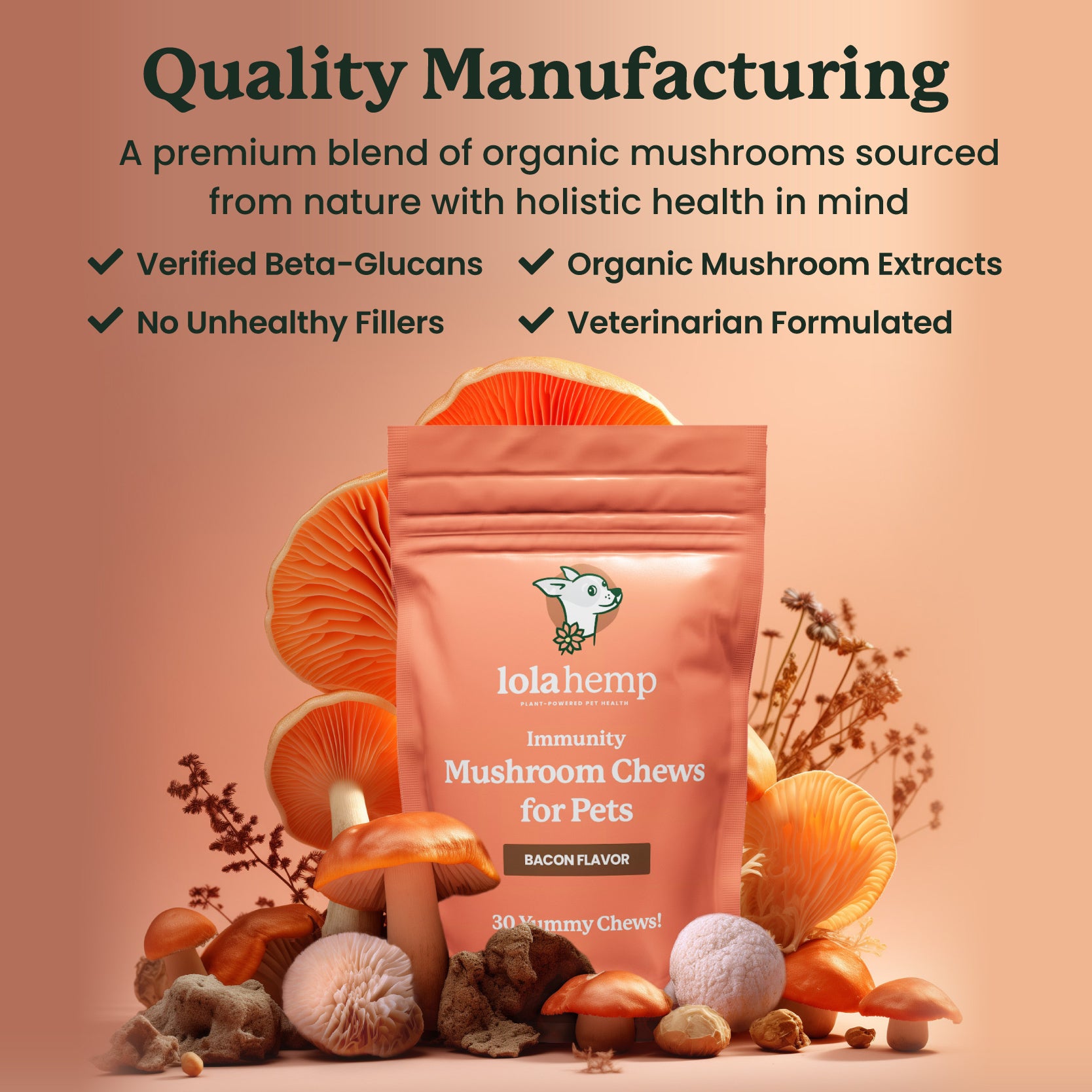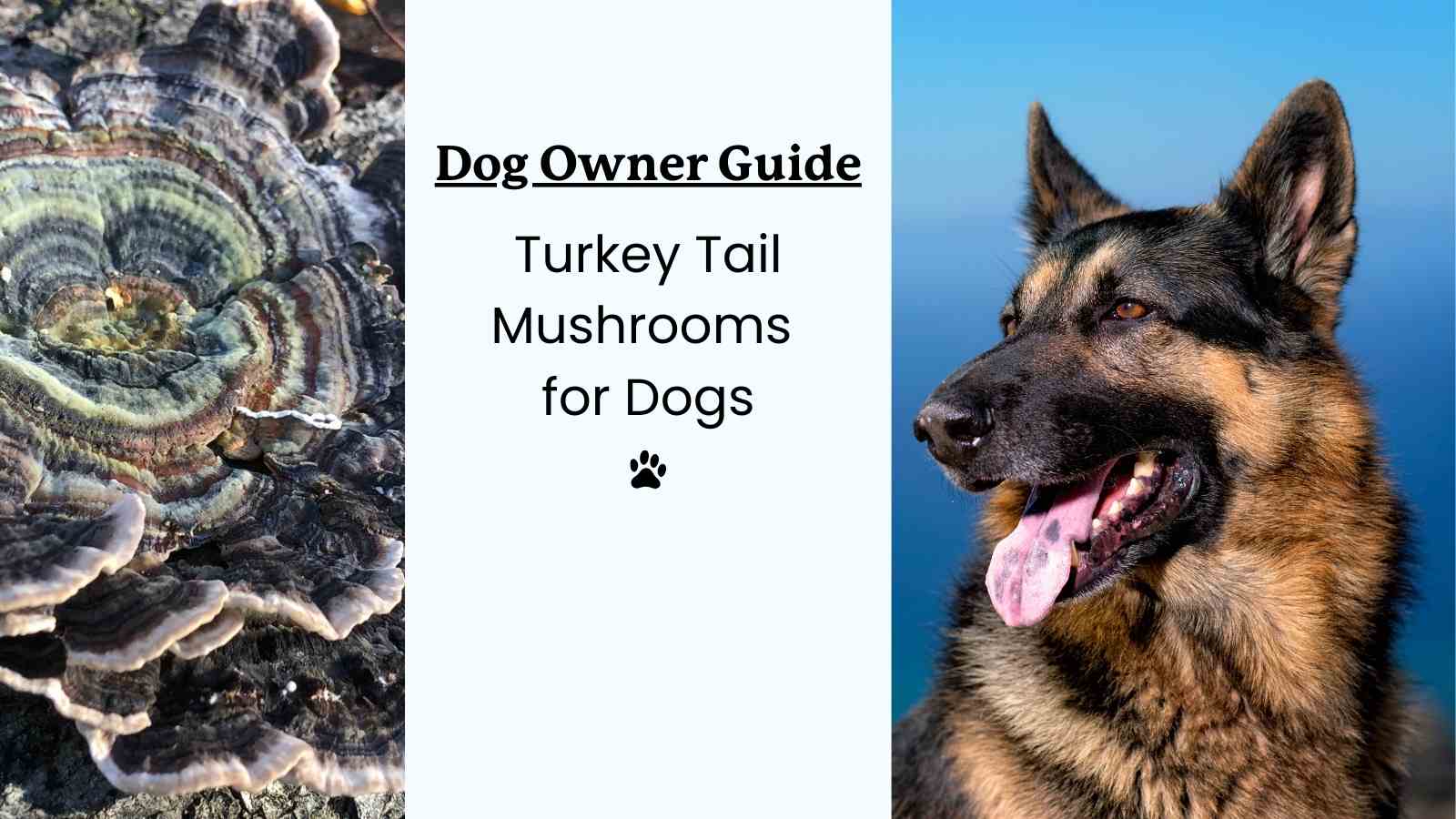Whether or not mushrooms are safe for dogs is a common question, and one that most people can't answer without looking into it. Mushrooms are mysterious, mainly because there are so many of them, many with extreme risks.
Some mushrooms can be very beneficial to dogs, while others are highly toxic and potentially fatal. If your dog has eaten a mushroom—either from your kitchen or outdoors—you may be wondering if your dog is in any danger.
Fortunately, your dog is not in any immediate danger if they've eaten a mushroom from your pantry; most mushrooms that are safe for humans are safe for dogs so long as they're plain.
In fact, the intentional use of a dog-safe mushroom product can provide a variety of real benefits for your pooch. With extended use of over a month or more, you could notice improved resilience to allergies and illness, healthier energy levels, and even a better ability to handle stress.
Let's learn more about the dos and don'ts of mushrooms for dogs, their benefits, and their risks when they're found in the wild.
Are Mushrooms Safe for Dogs?
Mushrooms that you can eat are generally safe for your dog to eat. If you're curious about particular mushrooms, we have a list in the next section that covers most common mushrooms that you or your dog would come into contact with.
If your dog eats a mushroom outdoors, this is always something to take seriously. Many wild mushrooms look identical to one another, and two mushrooms that look alike could have vastly different effects for your dog. If your dog eats a mushroom in the wild, you should call your veterinarian immediately.
What Happens if Your Dog Eats A Substantial Number of Mushrooms?
If your dog eats a large quantity of uncooked mushrooms from your pantry, they're not at risk of being poisoned but you might still want to take immediate action. While store-bought, plain mushrooms are typically safe for dogs, eating a large quantity of them can be problematic.
The key issue is digestive upset. Mushrooms are dense and fibrous, making them difficult to digest when eaten raw. Your dog could become constipated, bloated, or gassy, and these issues can be harmful to older dogs and dogs with pre-existing digestive issues.
Monitor your dog and see if they start showing signs of discomfort, and contact your veterinarian if anything unusual starts happening. Your dog's digestion may slow down a little, and that's to be expected with eating a large quantity of mushrooms.
If you notice any of the following signs, visit the vet right away:
- Your dog vomits more than twice
- Watery or bloody diarrhea
- Weakness, serious lethargy, difficulty standing
- Whining, pacing (signs of pain)
- Shaking, heavy panting, drooling
Which Mushrooms are Safe for Dogs?
Many mushrooms are safe for dogs, particularly those commonly found in grocery stores, such as:
- White Button Mushroom (Agaricus bisporus)
- Cremini Mushroom (Agaricus bisporus - brown variety)
- Portobello Mushroom (Agaricus bisporus - mature variety)
- Shiitake Mushroom (Lentinula edodes)
- Maitake Mushroom (Grifola frondosa) – aka "Hen of the Woods"
- Reishi Mushroom (Ganoderma lucidum) – known for immune support
- Turkey Tail Mushroom (Trametes versicolor) – supports gut & immune health
- Lion’s Mane Mushroom (Hericium erinaceus) – cognitive benefits
- Chaga Mushroom (Inonotus obliquus) – rich in antioxidants
- Cordyceps Mushroom (Cordyceps militaris) – supports energy & lung health
- Enoki Mushroom (Flammulina velutipes)
- Oyster Mushroom (Pleurotus ostreatus)
- King Oyster Mushroom (Pleurotus eryngii)
- Beech Mushroom (Hypsizygus tessellatus) – aka "Shimeji"
- Wood Ear Mushroom (Auricularia auricula-judae) – good for circulation
- Chestnut Mushroom (Pholiota adiposa)
- Poria Mushroom (Wolfiporia extensa) – used in traditional herbal medicine
- Snow Fungus (Tremella fuciformis) – supports skin & hydration
- King Bolete (Boletus edulis) – aka "Porcini" mushroom
- Almond Mushroom (Agaricus subrufescens) – known for immune benefits
- Blazei Mushroom (Agaricus blazei) – supports immune function
- Cauliflower Mushroom (Sparassis crispa)
- Milk Cap Mushroom (Lactarius deliciosus) – aka "Saffron Milk Cap"
- Golden Oyster Mushroom (Pleurotus citrinopileatus)
- Morel Mushroom (Morchella spp.) – ⚠ CAUTION: Must be fully cooked! Raw morels contain hydrazine toxins that can be harmful to dogs.
When are Mushrooms Dangerous for Dogs?
Wild mushrooms could always be dangerous to dogs, even fatal. When the mushrooms eaten were store-bought, they can still be dangerous if they were prepared with additional ingredients.
The trouble is that humans often prepare mushrooms with ingredients that can be very toxic to dogs. Here are common ingredients that can be toxic to dogs, and are often found in cooked mushrooms:
- Garlic (extremely toxic)
- Onions (highly toxic)
- Salt (dangerous when used heavily)
- Butter & Oil (can disturb the digestive system)
- Heavy seasoning (seasonings, when used in high amounts, can be dangerous)
If you cook mushrooms regularly, you know that these ingredients are extremely common. Many people don't enjoy eating mushrooms without one or more of these ingredients included, so always be cautious with your cooked, seasoned mushrooms around dogs.
What to Do If Your Dog Eats a Wild Mushroom
Step 1: Assess the Situation
If you suspect your dog has eaten a wild mushroom, act quickly. Wild mushroom poisoning can be deadly, and symptoms may take hours to appear.
- Look for leftover mushroom pieces – If possible, take a sample of the mushroom your dog ate.
-
Identify symptoms – Watch for signs of toxicity, including:
- Vomiting
- Diarrhea
- Excessive drooling
- Lethargy
- Tremors or seizures
- Jaundice (yellowing of the eyes or gums)
- Loss of coordination
- Abdominal pain
- Collapse or coma
Step 2: Seek Immediate Veterinary Care
If you think your dog ate a toxic mushroom, don’t wait for symptoms to appear—call your veterinarian or an emergency pet poison hotline immediately. Provide them with details about what your dog ate, their symptoms, and their size/breed.
- ASPCA Animal Poison Control Center: (888) 426-4435
- Pet Poison Helpline: (855) 764-7661
Step 3: Bring a Sample
If possible, take a sample of the mushroom with you to the vet. Wrap it in a damp paper towel and store it in a paper bag (not plastic) to preserve its structure. This can help veterinarians identify the mushroom and determine appropriate treatment.
Step 4: Monitor Your Dog Closely
If your vet advises at-home monitoring, watch for any of the above symptoms for the next 12 to 24 hours. Poisonous mushrooms can cause delayed reactions, so even if your dog seems fine at first, stay vigilant.

What are The Benefits of Safe Mushrooms for Dogs?
There are a handful of mushrooms that are considered the most beneficial for dogs. Mushrooms like reishi, shiitake, maitake, cordyceps, lion's mane, and turkey tail can provide significant benefits for our canine companions.
Here are the four key benefits of the use of healthy mushroom supplements for dogs.
1. Immune Support
Mushrooms like Turkey Tail, Reishi, and Shiitake are rich in beta-glucans—natural compounds that help balance the immune system. Rather than overstimulating, they help the body respond more appropriately. This makes them useful for dogs with recurring infections, seasonal allergies, or skin issues.
2. Improved Energy & Stamina
Cordyceps is known for supporting oxygen uptake and cellular energy production. It’s often used to help older dogs feel more energetic and playful, or to support dogs that seem fatigued or have low endurance during walks and play.
3. Cognitive Health & Focus
Lion’s Mane is a standout for brain support. It’s been studied for its ability to promote nerve growth and may help dogs with cognitive decline, nervousness, or difficulty focusing—especially seniors or dogs in training.
4. Stress Relief & Emotional Balance
Reishi is a calming adaptogen that helps the body regulate stress. It may promote more restful sleep, reduce anxious behaviors, and support overall mood balance—especially helpful for nervous or reactive dogs.

Frequently Asked Questions
1. Can dogs eat cooked mushrooms?
Yes, store-bought mushrooms that are plain and unseasoned are safe for dogs. However, avoid feeding mushrooms cooked with garlic, onions, butter, oil, or excessive salt, as these ingredients can be harmful.
2. Can dogs eat raw mushrooms?
Dogs can eat raw mushrooms from the grocery store in small amounts. However, cooking mushrooms can make them easier to digest and help release beneficial nutrients.
3. Can dogs eat wild mushrooms?
No. Wild mushrooms should always be considered toxic unless identified as safe by a professional mycologist. Many toxic mushrooms closely resemble edible ones, making it dangerous to feed wild mushrooms to your dog.
4. What happens if a dog eats a poisonous mushroom?
Depending on the type of mushroom, symptoms can range from mild stomach upset to organ failure and death. If you suspect your dog has eaten a toxic mushroom, seek emergency veterinary care immediately.
5. Are mushrooms good for dogs?
Yes, certain mushrooms offer health benefits when given appropriately. Mushrooms like reishi, lion’s mane, turkey tail, and maitake contain immune-boosting properties, antioxidants, and anti-inflammatory compounds. However, always introduce new foods with caution and consult your veterinarian before giving mushrooms to your dog.
Final Thoughts
Mushrooms can be both beneficial and dangerous for dogs. While grocery store mushrooms and certain medicinal mushrooms may offer health advantages, wild mushrooms pose a serious risk. If your dog eats a mushroom outdoors, assume it’s toxic and seek veterinary help immediately.
By staying informed and cautious, you can make the best decisions about mushrooms for your dog's diet and overall well-being.

